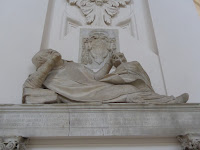 |
| Castelle di Arche |
Unlike the other Amalfi towns, Salerno did not feel like a
tourist destination; rather, it seemed to be populated primarily with
locals. The waterfront area has a nice
promenade along the Mediterranean. The old town has narrow streets and arches
connecting buildings as reinforcement. The
main shopping street in the old town is Via Merchanti, lined with shops and
some restaurants (clearly catering to locals).
Via Botteghelle is a cute medieval street. The town is a little grungy, similar to
Palermo, but it has character. Salerno
dates from Etruscan times, but the Romans established the city. Castelle di Arche, situated on the hilltop overlooking
the city, was built in the 8th century when Salerno was ruled by the
Byzantines after the fall of Rome. Salerno
was conquered by the Normans, who built an aqueduct in the 11th
century, sections of which still exist. The
Spanish ruled Salerno from the 15th to the 18th century,
when Salerno was brought into the unified Italy in 1861.
 |
| Norman aqueduct |
The most famous site to visit is the Duomo San Matteo (Cathedral
of Saint Matthew), which contains the bodily remains of St Mark the apostle and
disciple, which were discovered in the 10th century and moved to
Salerno. The Cathedral’s construction
was started in 1076, after the Normans conquered Salerno, to house St Matthew’s
remains. The four-sided portico, in the
shape of a courtyard, has relics and sarcophagi from the second and third
century.
 |
| Courtyard and bell tower |
 |
| Brass Cathedral doors |
 |
| Entrance to Cathedral courtyard |
 |
| Suckling lion at the gate |
 |
| St Matthew |
The cathedral has an austere nave, whitewashed during an 18th
century reconstruction. There are several elements to the altar area
that are beautiful, with inlaid tiles that look Arabic. The mosaics above the altar are incredible –
they were made by artisans from Ravenna as commissioned by William of Ravenna,
the archbishop of Solerno in the 12th century (Tammy and I saw the
Cathedral in Ravenna with mosaics that inspired these).
 |
| Ravenna mosaic above altar |
 |
| Nave and altar |
 |
| Pulpit tiles |
The crypt with the
remains of St Matthew was amazing, incredibly ornate marble mosaics and
frescoes on the walls and ceilings.
 |
| St Matthew Crypt |
 |
St Matthew tomb (behind
circular window with cross) |
The Church of St Peter in Chains is in the early phases of
restoration. The church was constructed
in the 9th century on a foundation comprised of ancient Roman baths. The Romanesque campanile (tower) was
constructed in 920.
 |
| St Peter in Chains tower |
 |
| St Peter in Chains restoration |
 |
| St Peter in Chains Christian fresco |
In Salerno, we were introduced to the Taralli, a savory bagel-shaped
biscuit with fennel and other spices served with wine. They are served all over Amalfi and Tuscany,
but none taste as good as the Salerno Taralli.
 |
| Duomo San Matteo |
 |
| Cathedral mosaic |
 |
| Ave Maria mural |
 |
| Norman aqueduct |
 |
| Taralli |


























No comments:
Post a Comment